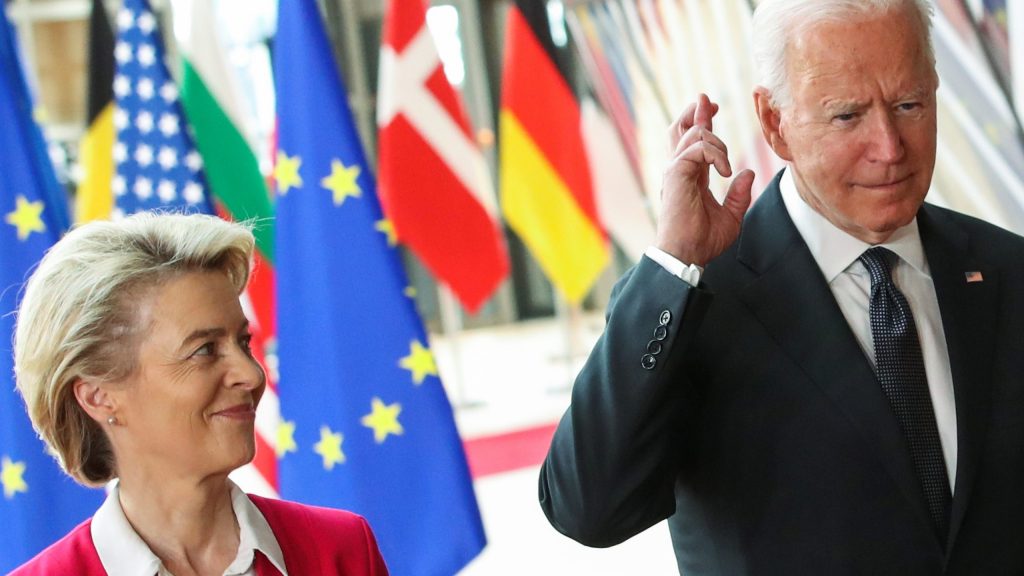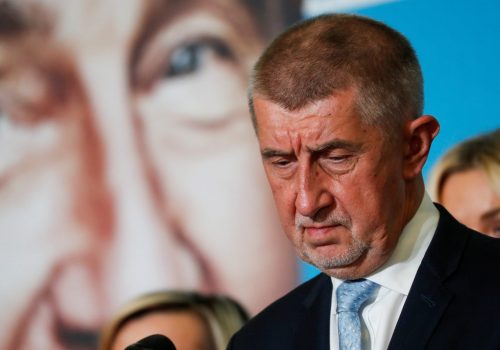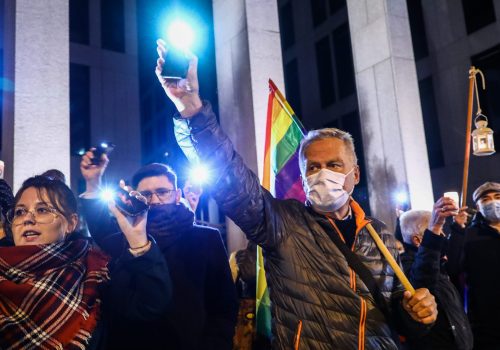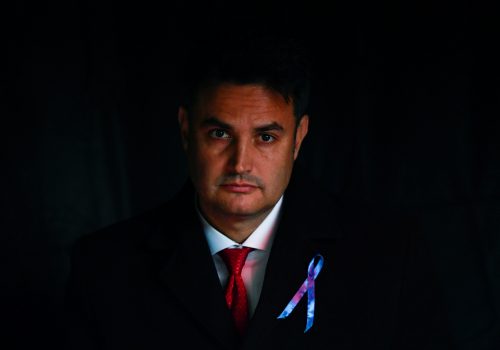Summitry has not been the forte of the Biden administration. European diplomats have commented privately to me that the United States did insufficient prep work before both the Group of Seven (G7) in June and the United Nations Climate Change Conference of the Parties (COP26) last month, and it clearly was not on top of its own political machinery to come up with the kinds of solutions that can make a difference.
That’s why it would be tempting to dismiss this week’s Summit for Democracy—which has been relegated due to COVID-19 from a flagship gathering of world leaders to a virtual conference with few expected deliverables. But that would be wrong: The event offers a critical new approach to fighting corruption by focusing on democracy protection, rather than democracy promotion, taking the approach of fixing your own house first.
Fighting corruption is one of the three priorities of the summit (the other two being defending against authoritarianism and promoting respect for human rights). This time, the United States is bringing a genuine policy document to the table: The United States Strategy on Countering Corruption, published this week, is the administration’s most impressive strategy document to date, as it focuses particularly on multilateralism and reforming existing US anti-money-laundering regulations. It was widely praised by the anti-corruption community in Washington: Paul Massaro, a senior policy advisor for Congress’ bipartisan Commission on Security and Cooperation in Europe (aka the Helsinki Committee), summed up the mood when he tweeted that the strategy is “exactly what we’ve been waiting for.” The United States is not coming empty-handed to the Summit for Democracy.
The document places a special emphasis on multilateralism. The United States Treasury has promised to work internationally against tax evasion and to make the US and global systems of taxation more equitable. It has also acknowledged that it must step up the fight against the proceeds of foreign government corruption being held at US financial institutions. Cooperation with existing multilateral organizations and the use of new programs as platforms for anti-corruption and countering kleptocracy are highlighted as well. This includes NATO’s Building Integrity Program and USAID’s new Global Accountability Program (GAP), the latter of which is meant to increase asset recovery from kleptocrats and will be presented in greater detail at the summit. Providing more backing to international legal standards against corruption, such as the United Nations’ Convention against Corruption, is also referenced several times.
Given the emphasis on allied coordination, the European Union (EU) and the United Kingdom (UK) should respond accordingly by matching the US commitment to fighting corruption. The level of buy-in is already considerable, with European Commission President Ursula von der Leyen chairing one of the panels at the summit, but EU and UK leaders should also commit to a range of steps. Those include:
- The EU and UK should join forces with GAP and the US State Department-led Democracies Against Safe Havens initiative outlined in the report, which is designed to increase the effectiveness of sanctions against kleptocrats and other corrupt actors.
- They should commit to producing their own strategies, updated to sync with the strategy the Biden administration has just published.
- They should propose to match the US efforts in increasing scrutiny over historically less-regulated financial sectors such as real estate, private investment, and legal services, and passing similar legislation to tighten their regulatory regimes. They should coordinate efforts at the G7, Group of Twenty (G20), Organization for Economic Co-operation and Development (OECD), and other international forums.
- The EU should propose that the United States, EU, and UK create a Transatlantic Anti-Corruption Council, modeled on the success of the US-EU Trade and Technology Council, to coordinate their policies, regulations, and diplomatic initiatives in a more systematic manner on corruption.
There is, in fact, a grand strategy in this push for regulatory coordination. Faced with pressure from the growing global might of China and a world in which threats criss-cross the traditional divisions between “home” and “abroad,” the answers to foreign policy are now often found in domestic tools. The transatlantic alliance needs to evolve a new tissue where this kind of cross-cutting regulatory coordination takes place. Let a thousand councils bloom.
It’s worth remembering that the strengths and weaknesses of the democratic and authoritarian models expose themselves cyclically. Democracies, as is now the case in much of Western Europe, may face rapid turnover among their leaders, but autocracies can see their leadership sink into decrepitude, with Russian President Vladimir Putin and Chinese President Xi Jinping showing no signs of leaving the stage. Democracies may be dysfunctional, like the United States is now, but systemic corruption can paralyze and unsettle autocracies, like what happened in the build-up to the Arab Spring.
The Helsinki Accords, for instance, were scorned when they were first signed, since Western democracy seemed to be in decline following the Vietnam War, the Watergate scandal, and the energy crises of the 1970s. Yet within a decade, the Helsinki Accords empowered anti-authoritarian sentiment throughout the Eastern Bloc, which paved the way for its eventual demise. If the work done at the Summit for Democracy can contribute to protecting democracy, it can be well-placed for the next challenges the authoritarian states will inevitably face.
Ben Judah is a senior fellow at the Atlantic Council’s Europe Center.
Further reading
Thu, Oct 14, 2021
Is liberalism ending its losing streak in Central Europe?
New Atlanticist By Petr Tůma
The Czech opposition's victory could inspire other democratic forces across the region.
Tue, Nov 9, 2021
How to get Biden’s democracy summit right
New Atlanticist By Daniel Fried, Rose Jackson
Two of the Council’s democracy experts say the upcoming Summit for Democracy needs to take aim at autocrats’ tools by focusing on anti-corruption and tech standards, and elevating civil society.
Thu, Nov 18, 2021
‘Hungary is not a democracy anymore,’ says opposition leader
New Atlanticist By Dan Peleschuk
Péter Márki-Zay, an engineer-turned-politician who now leads Hungary's opposition, joined the Atlantic Council for a discussion about the future of his country.
Image: US President Joe Biden crosses his fingers next to European Commission President Ursula von der Leyen as they attend the EU-US summit, in Brussels, Belgium on June 15, 2021. Photo by Yves Herman/Reuters.



